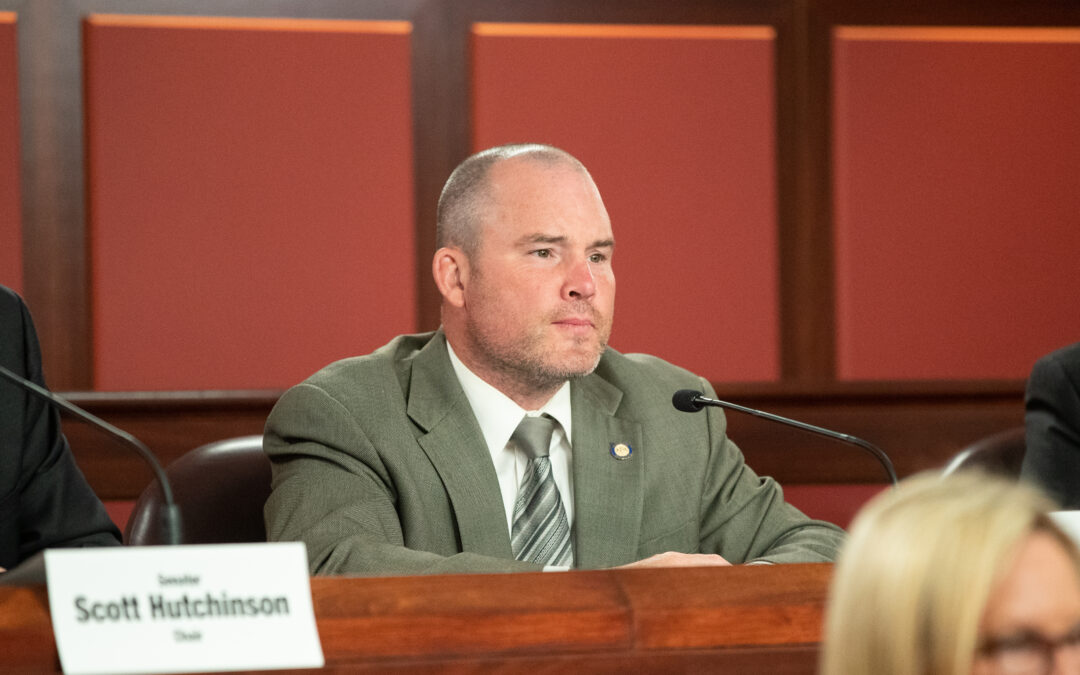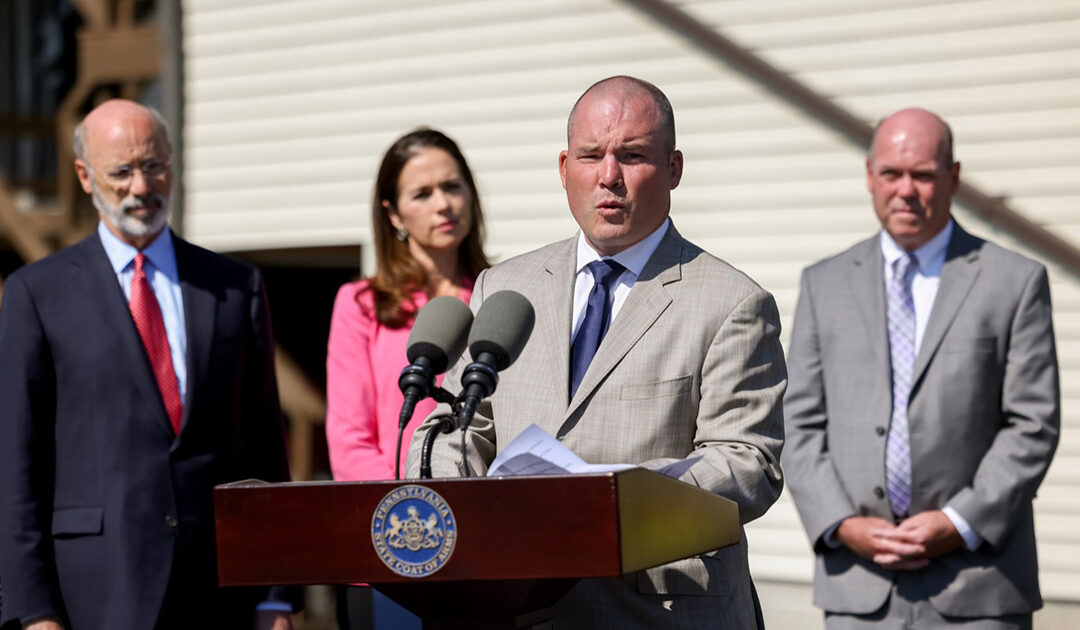
October 19, 2021
Harrisburg, October 19, 2021 – Legislation introduced in honor of a fallen Scranton police officer, John Wilding, received bipartisan support today from the Senate Judiciary Committee chaired by Senator Lisa Baker.
Introduced by Senator John Yudichak (I-Luzerne/Carbon) and Senator Marty Flynn (D-Lackawanna/Luzerne/Monroe), Senate Bill 814 would strengthen the crimes code by adding penalties for fleeing an officer by foot to evade arrest.
Six years ago, Scranton Police Officer John Wilding lost his life in pursuit of suspects who fled the crime scene to evade arrest.
“Officer Wilding dedicated his life to upholding the law and protecting the citizens of Scranton, it’s time for lawmakers to honor Officer Wilding’s service by ensuring no police officer’s life is ever put in danger by criminals who try to evade arrest,” said State Senator Yudichak.
Officer Wilding died on July 12, 2015 as a result of injuries he sustained in the line of duty.
When individuals flee from police officers attempting to lawfully place them under arrest, they create a risk of harm not just to police, but to innocent bystanders and themselves.
Existing statute currently prohibits fleeing from an officer in a vehicle and struggling with an officer attempting to place an individual under lawful arrest, however the statute is silent with respect to fleeing an officer on foot and placing the officers or innocent bystanders at risk of injury. This bill will create a new offense of “Evading Arrest or Detention by Foot.” It’s modeled after a similar statute in the state of Texas.
Officer Wilding was a 2004 graduate of Mid Valley Secondary Center in Throop and attended Pennsylvania State University. He was a 2012 graduate of the Act 120 Municipal Police Officers Training Program at Lackawanna College before joining the Scranton Police Department in April 2014.
“I am pleased that the Senate Judiciary Committee voted today to pass Senate Bill 814, which was drafted in response to the tragic death of Officer John Wilding of the Scranton Police Department,” said State Senator Flynn. “This measure will put some teeth into the law and hold those who harm police, while fleeing on foot accountable for their actions.”
“Just days ago, we had a very moving memorial ceremony for police officers who lost their lives in the line of duty,” said State Senator Baker. “With this bill, we are seeking to clarify a potential gap in current law, and once again take a step to further protect law enforcement and punish lawbreakers whose reckless actions cost the lives of police officers.”
During the 2019-2020 legislative session, the previous version of the legislation unanimously passed the Senate Judiciary Committee. After receiving feedback from advocates and officers around the state, language was included to further provide for the protection of police animals in the event an individual is evading arrest.

September 17, 2021
Our Student Ambassador Program begins later this year, and applications are now open! We’ll be selecting one high school senior from each school in District 22 to participate in the program, which will give students a first-hand look at how the law-making process works in the Pennsylvania State Senate. From attending legislative meetings to touring the Capitol building in Harrisburg, these students will be given wonderful opportunities to learn about our state government and spend time with fellow dedicated, motived students from across our district. You can apply here on the website or ask your school’s guidance department; the deadline to apply is October 8th.

August 5, 2021
Old Forge, PA – August 5, 2021 − Governor Tom Wolf today visited Cafe Rinaldi in Old Forge to highlight $2.3 million in state grants awarded to Lackawanna County restaurants adversely affected by the pandemic. The governor secured $145 million for the COVID-19 Hospitality Industry Recovery Program (CHIRP) last year to provide pandemic relief to the restaurant and hotel industry in Pennsylvania.
“Restaurants and bars are an important part of the Lackawanna County economy, and this funding is helping them to rebound from the difficult times caused by the pandemic,” said Gov. Wolf. “My administration is proud to have secured $145 million to support the industry statewide and I’m grateful to our local partners and the small businesses for their tremendous effort of the past year and a half.”
The governor was joined for a press conference in Old Forge by Sen. Marty Flynn, Rep. Bridget Kosierowski, the Pennsylvania Department of Community and Economic Development, Greater Scranton Chamber of Commerce President Bob Durkin, other local officials, and the owner of Café Rinaldi.
“These CHIRP grants helped the owners and employees of local businesses through very tough times,” said Sen. Marty Flynn. “These restaurants are vital to our area, allowing us to gather socially and making us a real community.”
“The COVID-19 Hospitality Industry Recovery Program was a great step forward to helping people, helping families and helping local businesses keep the doors open,” said Rep. Bridget Kosierowski. “It delivered nearly 150 million dollars to help our restaurants and hotels and theaters – and the people who work there. This was money for every single county across the commonwealth. This was real help for real people who had spent the last year fighting to survive. Governor Wolf made this funding possible because he recognized that this funding would help put us in position to bounce back faster and reach greater heights.”
The Wolf Administration worked with counties and economic development partners to quickly send assistance to the hospitality industry.
Counties administered the funding through one or more designated Community Economic Development Organizations (CEDO) or Community Development Financial Institutions (CDFI), which began processing applications from businesses in each county on March 15. All funding was distributed to businesses as of last week.
“Throughout this pandemic we at the Chamber have been proud to partner with The Commonwealth and Lackawanna County to play our part in addressing the financial, operational and health needs of our small businesses,” said Robert Durkin, President of Greater Scranton Chamber of Commerce. “These funds have helped hundreds of business owners and thousands of employees sustain their operations in the face of the unprecedented challenges of COVID-19.”
Lackawanna County received $2,374,844 in CHIRP funding from the state, which local officials supplemented with $141,406 for a total of $2,516,250. CHIRP grants were received by 171 businesses, including a $25,000 grant for Café Rinaldi.

July 23, 2021
Earlier today, the Pennsylvania Infrastructure Investment Authority (PENNVEST) approved a $2,326,900 loan to the Lackawanna River Basin Sewer Authority for the rehabilitation and removal of an aged wastewater pump. The pump, located in Vandling, is currently the cause of raw sewage overflow and discharge, which poses health and environmental risks which this project will alleviate. According to the Sewer Authority, the goal is to eliminate the overflow point by diverting it to a Clinton Township wastewater treatment plant and constructing 6,500 feet of 15- to 24-inch gravity interceptor sewer. As a result, it will stop the source of the sewage from affecting a high-quality, cold-water fishery, and will reduce pollution to a nearby stream. In addition, it will significantly decrease operation and maintenance costs at the pump station and offer significant energy savings. Once completed, it will eliminate the health risks the wastewater pump currently causes, directing all flows to a treatment facility and preventing untreated sewage from entering a public waterhouse.




